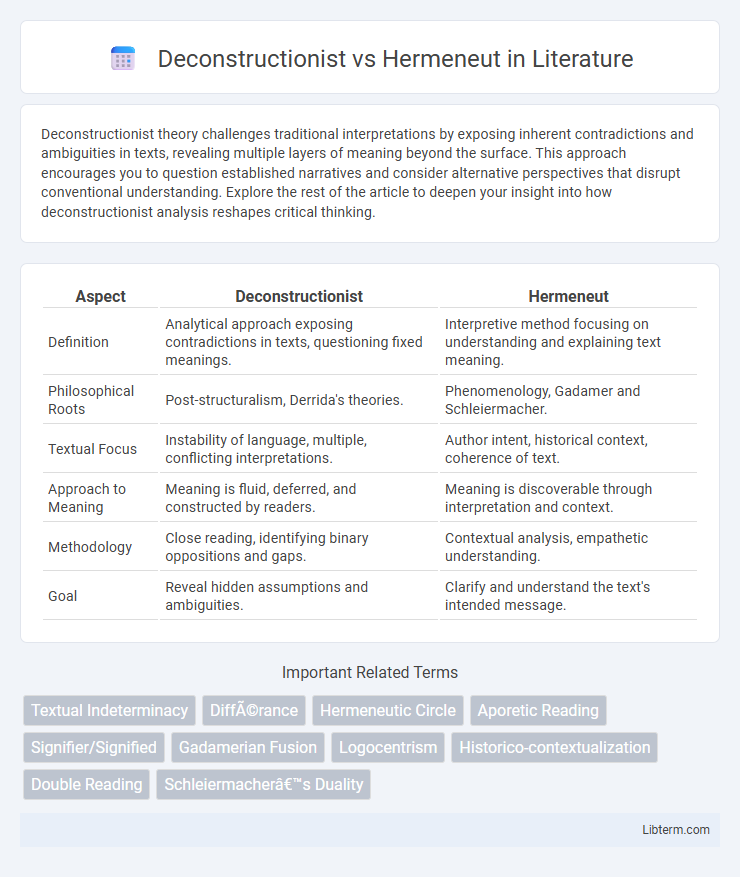Deconstructionist theory challenges traditional interpretations by exposing inherent contradictions and ambiguities in texts, revealing multiple layers of meaning beyond the surface. This approach encourages you to question established narratives and consider alternative perspectives that disrupt conventional understanding. Explore the rest of the article to deepen your insight into how deconstructionist analysis reshapes critical thinking.
Table of Comparison
| Aspect | Deconstructionist | Hermeneut |
|---|---|---|
| Definition | Analytical approach exposing contradictions in texts, questioning fixed meanings. | Interpretive method focusing on understanding and explaining text meaning. |
| Philosophical Roots | Post-structuralism, Derrida's theories. | Phenomenology, Gadamer and Schleiermacher. |
| Textual Focus | Instability of language, multiple, conflicting interpretations. | Author intent, historical context, coherence of text. |
| Approach to Meaning | Meaning is fluid, deferred, and constructed by readers. | Meaning is discoverable through interpretation and context. |
| Methodology | Close reading, identifying binary oppositions and gaps. | Contextual analysis, empathetic understanding. |
| Goal | Reveal hidden assumptions and ambiguities. | Clarify and understand the text's intended message. |
Introduction to Deconstructionism and Hermeneutics
Deconstructionism, primarily developed by Jacques Derrida, challenges traditional interpretations by exposing inherent contradictions and ambiguities within texts, highlighting the instability of meaning. Hermeneutics, rooted in the philosophy of Schleiermacher and Gadamer, emphasizes the art of interpretation, focusing on understanding context, authorial intent, and the historical background to derive coherent meaning. Both approaches critically analyze texts but diverge in methodology: deconstruction dismantles assumed meanings while hermeneutics seeks to reconstruct and comprehend them.
Historical Origins and Key Influences
Deconstructionism emerged in the late 1960s, primarily influenced by philosopher Jacques Derrida, who challenged traditional structures of meaning and emphasized the instability of language in texts. Hermeneutics traces back to ancient philosophy, with foundational thinkers such as Friedrich Schleiermacher and Hans-Georg Gadamer developing theories on interpretation based on historical context and authorial intent. Key influences of deconstruction include structuralism and post-structuralism, while hermeneutics is deeply rooted in theological exegesis and phenomenology.
Core Principles of Deconstructionism
Deconstructionism centers on the idea that texts contain inherent contradictions and multiple meanings, challenging the notion of fixed or singular interpretations. It emphasizes the instability of language and the role of binary oppositions, revealing hidden assumptions and power structures within texts. Unlike Hermeneutics, which seeks to uncover the author's intended meaning, Deconstructionist analysis dismantles traditional interpretations to expose ambiguity and the fluidity of meaning.
Fundamental Concepts in Hermeneutics
Hermeneutics centers on the interpretation of texts, emphasizing context, authorial intent, and the historical background to uncover meaning. Unlike Deconstructionism, which challenges fixed meanings and highlights inherent textual contradictions, Hermeneutics seeks to bridge the gap between the text and the reader's understanding. Key concepts include the hermeneutic circle, where interpretation is an iterative process between the parts and the whole, and the role of pre-understandings influencing comprehension.
Textual Analysis: Approaches and Methodologies
Deconstructionist textual analysis challenges traditional interpretations by exposing inherent contradictions and ambiguities within a text, emphasizing the instability of meaning and the role of language in shaping understanding. Hermeneutic methodologies prioritize the historical and cultural context, aiming to uncover the author's intended meaning through iterative interpretation and synthesis. Both approaches critically engage with texts, but deconstruction destabilizes meaning to reveal multiple interpretations while hermeneutics seeks coherence and deeper insight through contextual analysis.
Interpretation of Meaning: Divergences and Overlaps
Deconstructionists view interpretation as a process that reveals inherent contradictions and multiple meanings within a text, challenging fixed or authoritative readings. Hermeneutics emphasizes understanding the intended meaning by exploring historical context, authorial intent, and the text's coherence. Both approaches acknowledge the complexity of meaning but diverge on whether interpretation stabilizes meaning or continuously destabilizes it.
Major Thinkers: Derrida vs. Gadamer
Jacques Derrida, a pivotal figure in deconstructionism, challenged traditional interpretations by exposing inherent contradictions and ambiguities in texts, emphasizing the instability of meaning. Hans-Georg Gadamer, a leading hermeneutic philosopher, focused on the historicity of understanding, advocating for the fusion of horizons where the interpreter's context dialogues with the text's original meaning. While Derrida deconstructs language to reveal multiple interpretations, Gadamer stresses the importance of tradition and dialogical engagement to uncover authentic understanding.
Impact on Literary Criticism and Philosophy
Deconstructionist theory, pioneered by Jacques Derrida, challenges traditional literary criticism by exposing inherent contradictions and ambiguities in texts, thus undermining fixed meanings and encouraging multiple interpretations. Hermeneutics, rooted in the works of Gadamer and Schleiermacher, emphasizes understanding the author's intent and historical context to interpret texts meaningfully, fostering dialogue between the text and reader. Both approaches have profoundly influenced philosophy and literary criticism by reshaping concepts of meaning, interpretation, and the relationship between language and truth.
Critiques and Controversies in Both Approaches
Deconstructionism faces critiques for its perceived relativism and tendency to undermine stable meanings, leading to accusations of intellectual nihilism. Hermeneutics is often critiqued for its potential subjectivity and risk of imposing the interpreter's biases onto the text. Both approaches spark controversy over their methods: deconstruction challenges traditional interpretations by destabilizing texts, while hermeneutics emphasizes seeking coherent understanding, causing debates on the limits of interpretation and meaning.
Contemporary Relevance and Future Directions
Deconstructionist approaches critically challenge fixed meanings in texts, emphasizing the fluidity and instability of language, which remains relevant in contemporary debates around digital media interpretation and identity politics. Hermeneutics continues to provide vital frameworks for meaning-making by focusing on historical context and authorial intent, essential for understanding cultural phenomena and legal texts in an increasingly globalized world. Future directions involve integrating deconstructionist skepticism with hermeneutic dialogue to address complexities in artificial intelligence communication and intercultural understanding.
Deconstructionist Infographic

 libterm.com
libterm.com